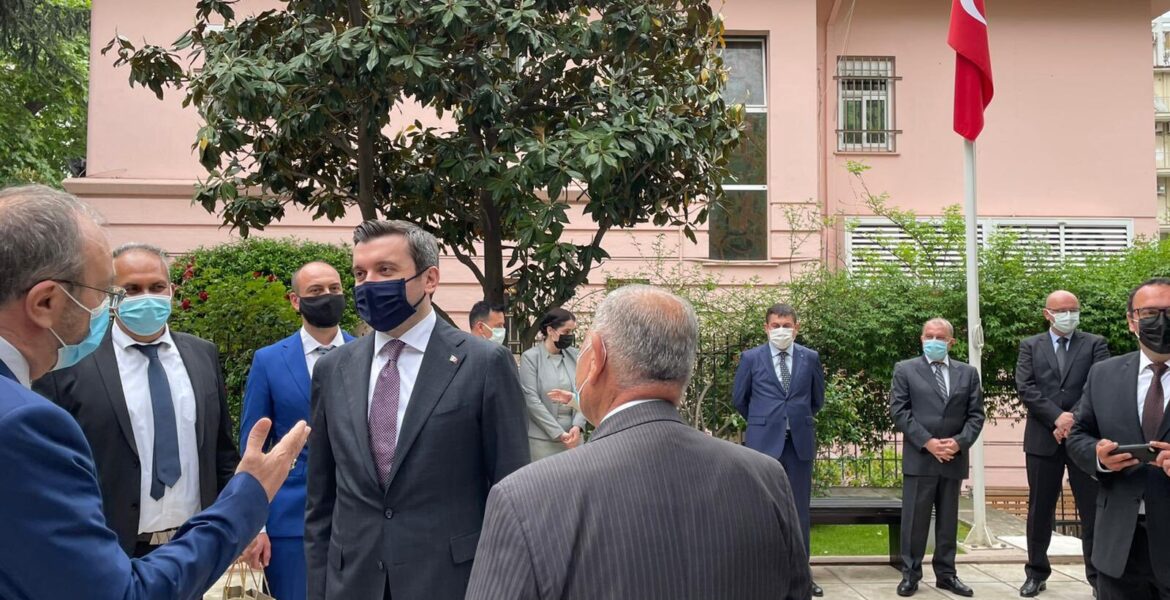Turkish Deputy Foreign Minister Yavuz Selim Kıran is unashamedly making provocations against Greece, even during his visit to Thessaloniki today.
On Twitter, he said that he met representatives and religious officials of the Turkish community in Thessaloniki, where he claimed that they face "restrictions on freedom of language, religion and worship."
He also claimed that "our kinsmen [...] conserve their identity and religion against all odds."
We met w/representatives and religious officials of Turkish community in #Thessaloniki.
🔸Pressures&restrictions on freedom of language,religion&worship against our kinsmen are unacceptable.
🔸We are always with our kinsmen, who conserve their identity&religion against all odds. pic.twitter.com/j5atLnicjR— Yavuz Selim KIRAN (@yavuzselimkiran) May 5, 2021
It comes as only yesterday the Turkish Foreign Ministry released a statement saying that the Deputy Foreign Minister will meets with "members of the Turkish Minority in Western Thrace."
Turkey’s own Foreign Ministry website affirms that there is only a Muslim minority in the Treaty of Lausanne Part VI Article 2 that states:
“Moslems established in the region to the east of the frontier line laid down in 1918 by the Treaty of Bucharest shall be considered as Moslem inhabitants of Western Thrace.”
The Treaty of Lausanne, which outlined the modern borders of Turkey after the collapse of the Ottoman Empire, affirms that there is only a Greek Muslim minority in Western Thrace.
Despite this legal document, in recent years the Erdoğan regime has challenged the Treaty of Lausanne.
Turkey now describes all 120,000 Muslims in Greece's Western Thrace as "Turks" irrespective of whether they are Roma, Pomak (Slavic-speaking Muslims) or Greek.
The Ottoman millet system assigned ethnicity by religion, rather than language, culture, self-identification and familial history.
In this way, all Muslims in the Balkans, irrespective of their ethnic background, were described as Turks, something that the Erdoğan regime is attempting to revive despite the Treaty of Lausanne.
Although Kıran says Greek Muslims survived "against all odds," the fact is that near the signing of the Treaty of Lausanne, the Muslim population in Western Thrace stood at 86,000.
Today it is 140,000 strong.
There were 125,000 Greeks living in Constantinople (Κωνσταντινούπολις, Turkish: İstanbul) at the signing of the Lausanne Treaty in 1923, but today there are less than 1,000 due to Turkish state and ultra-nationalist persecution and violence.
In Thessaloniki, Kıran visited the Geni Mosque and was informed about the history of the building, showing interest in both the interior and exterior of the building.
He also visited the birth house of Mustafa Kemal Atatürk, the founder of the Turkish Republic and an architect of the Greek, Armenian and Assyrian Genocide that was recently recognised by U.S. President Joe Biden.
READ MORE: Turkish claims on demilitarising the Aegean Islands via Treaty of Lausanne are fake: Here’s why.


